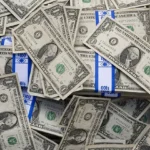The U.S. economy presents a stark contrast between affluent and low-income households. As wealthy Americans benefit from rising stock and home prices, poorer households struggle with high rents, rising interest rates, and stagnant wages. This growing divide has significant implications for both the economy and the political landscape.

Recent Federal Reserve meetings highlight concerns over the financial stress low- and moderate-income families face. These households increasingly rely on credit cards and buy-now-pay-later services, leading to higher delinquency rates on consumer loans. In contrast, wealthier households continue to enjoy favorable conditions due to substantial gains in equity and real estate.
Delinquency rates for credit cards and auto loans have surpassed pre-pandemic levels, with about 6.9% of credit card balances seriously delinquent by the end of the last quarter, according to the New York Fed. This financial strain among working-class Americans is a key factor behind the negative sentiment towards the economy and President Biden, as reflected in major polls.
Consumer Spending Patterns Reveal Economic Divide
The recent earnings reports from various companies underscore the selective nature of current consumer spending. While high-end consumers continue to splurge on travel and premium services, low-income consumers are cutting back on essentials and discretionary spending. This trend is evident across multiple sectors, from fast food to home improvement.
For instance, companies like McDonald's and Home Depot reported weaker-than-expected results, attributing this to reduced spending by lower-income consumers. Conversely, Delta Air Lines and Chipotle, which cater to higher-income demographics, have seen growth and robust spending. This bifurcation in spending patterns highlights the economic divide, where the affluent can maintain their lifestyle while the less fortunate tighten their belts.
Walmart has noted a shift in consumer priorities, with shoppers focusing more on food and health-related items over general merchandise. This trend is particularly pronounced among lower-income consumers, who face higher living costs and have exhausted their pandemic-era savings. Meanwhile, brands like McDonald's are introducing value meals to attract budget-conscious customers.
Rising Interest Rates and Inflation Exacerbate Inequality
Interest rates and inflation are further deepening the economic divide. As the Federal Reserve continues to tackle inflation, higher borrowing costs disproportionately affect low-income households. These families are more likely to rent their homes and rely on credit, making them vulnerable to economic fluctuations.
The New York Times reports that while interest rates aim to control inflation, they also contribute to economic inequality. Higher rates increase the cost of debt, burdening those already struggling with high expenses. This situation has led to a decrease in disposable income for lower-income households, impacting their ability to spend on necessities and discretionary items.
The Morning Porridge highlights the significant stress under the surface of a seemingly robust economy. Consumers, corporations, banks, and the government grapple with mounting debt and its consequences. Rising debt delinquencies and changes in spending patterns indicate that many Americans live paycheck to paycheck, with little financial cushion. This scenario creates a fertile ground for political populism, as disenfranchised voters seek leaders who promise to protect their interests.
Corporate Earnings Reflect Consumer Behavior Shifts
Corporate earnings calls reveal how different segments of the population are responding to economic pressures. Companies like Coca-Cola and McDonald's note a clear divide, with low-income consumers feeling the pinch more acutely. Meanwhile, brands catering to higher-income brackets like Chipotle continue to thrive.
The concentration of economic gains among the top earners also skews the corporate landscape. The largest companies dominate market value and profits, while many mid-sized firms struggle with negative earnings and high rates. This concentration of wealth and economic power further exacerbates inequality and increases the risk of instability.
The broader implications of these trends are significant. As economic pressures mount on lower-income households, the risk of a hard landing for the U.S. economy grows. Factors such as high default rates on credit cards and auto loans, and stress in the commercial real estate sector, could trigger broader economic disruptions.
Addressing the Economic Divide
The economic divide in the U.S. highlights the urgent need for policies that address inequality and provide support for struggling households. As the Federal Reserve and policymakers navigate these challenges, a balanced approach that considers the needs of all economic segments is crucial. Ensuring economic stability and resilience will require addressing the root causes of inequality and implementing measures to support both economic growth and financial security for all Americans.

Carl Riedel is an experienced writer and Open Source Intelligence (OSINT) specialist, known for insightful articles that illuminate underreported issues. Passionate about free speech, he expertly transforms public data into compelling narratives, influencing public discourse.













